Unit致用英语综合教程
致用英语综合教程unit2[精品]
![致用英语综合教程unit2[精品]](https://img.taocdn.com/s3/m/577792074531b90d6c85ec3a87c24028915f85d5.png)
Unit 2 Knowing our bodyTeaching objectivesAfter learning this unit, Ss will learn how to✧Describe the body parts✧Talk about the functions of the body parts✧Use comparatives and superlatives✧Use the body languageTeaching focusGrammar: comparatives and superlativesV ocabulary building: Name of body parts; base adjectives and strong adjectivesImportant words and phrases: attempt, wonder, sight, blind, stump,quest,couple, smart, hurt, shock, confusion, lesson, reply, selfish, sympatheticTeaching difficulties1. Understanding the structure and main idea of the text.2. Grammar: comparatives and superlativesTeaching ProceduresI. Warming-up questions:What knowledge of human body do you get from the documentary film? Which parts of human body does the documentary mention? (Y ou can skim through new words before l i steni ng.)II. Listening and speaking (1 period)a.This is a lead-in to the listening part. Before playing the recording, askstudents to read the questions. Then play the recording and encounrage students to take notes while listening.anize a speaking activity based on the listening material. First ask Ss toform groups and have a discusssion about which is the mose imortant bosy part. Then ask Ss to role-paly the dialogue in the listening part. Remind them they may use their own language.III. Reading 4 periods1.Pre-reading tasks:Before you read, discuss the foll owi ng questi ons i n groups:a. Has any part of your body ever been injured? If yes, what inconveniences did it cause?Work in groups and share your experiences.b. Have you ever read or heard stories about body parts?2.Reading comprehensiona.Ask Ss to read the text first and then answer the questions in Comprehension Check.b.In this sextion,you may organize a class discussion based on the article students have just studied. This discussion activity is necessary for language learners. They should be able to and present their own experiences after they have received the input information.3.Detailed learning of the textLanguage points※attemptn. an act of trying to do something, especially something difficulte.g. She passed her driving test at the first attempt.v. to try to do something, especially something difficulte.g. He attempted to open the door.He attempted to lie.※stump v.1)if you are stumped by a question or problem, you are unable to find an answer to ite.g. The doctors were stumped and had to call in a specialist.The police were stumped about the motivebehind the murder.(警方给难住了,无法查明这次谋杀的动机。
致用英语综合教程1_UNIT1_教案及课件

• What are Peter martin’s advices? • • • • • • • Listen and answer Advice1 : Advice 2: Advice 3: Advice 4: …… Are you puzzled with all these advices?
e.g. People tend to need less sleep as they
get older.
Plants tend to die in hot weather if you
don’t water them.
Warm-up Reading Language in use Project Learning to learn
T
Para. 3
3.
Find your own way.
Warm-up Reading Language in use Project Learning to learn
People tend to learn language in different ways. Some are fond of analyzing the language and need a rule for everything. Others are more intuitive; they prefer to gather examples and imitate them. Some need lots of repetition, while others hate repetition practice. In a classroom situation, the teacher cannot meet every student’s needs. Therefore, you cannot always rely on your teacher to provide you with a way that is specially designed for you. You need to experiment and discover what works best for you.
致用英语综合教程综合英语2教案unit
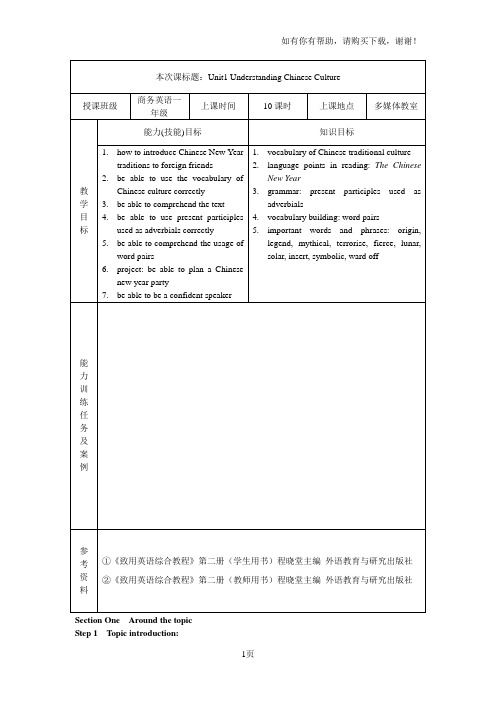
Section One Around the topic Step 1 Topic introduction:Many Chinese students find it very difficult to introduce Chinese culture to foreign friends.The biggest problem is that they don’t know how to express their understanding about Chinese culture or how to explain some typical concepts in Chinese culture. Chinese learners of English as a foreign language should not only study western cultures, but also deepen their understanding of Chinese culture, so that they can introduce it to the outside word.Step 2 Your ideasWork in groups or pairs and discuss the following questions1)Why is spring Festival so important for the Chinese people?2)What do you usually do during the Spring Festival3)Are there any special celebration activities in your hometown during Spring Festival?4)In what ways do you think the Spring Festival has Changed?How much do you know about the Chinese New Year?A.Which day in the 15-day celebration is for the sons-in-laws to pay a visit to theirparents-in-law?The third and fourth days.B. What is the fifth day called?Po Woo.C. How many kinds of traditional New Year food do you know?Dumplings, a whole fish, chicken, New Year cake…D. Do we use knives or scissors on New Year's Day?NO. They may cut off fortune.E. What fruit do we usually use as a decoration during the Spring Festival?Oranges and Tangerines. They are symbols for abundant happiness.Step 3 VocabularyThere are some special things about Spring Festival, which are difficult to translate into English. Here are some English words and expressions related to the Spring Festival. Try to get their meanings.Remind students that names of some typical Chinese things do not have exact equivalents in English. Ask them to guess the meaning of the English words and phrases related to thecan give a brief talk with some of the words in the table above so that they can master a better usage of these words.Step 4 Listening and speakingAsk students to read the questions first. Then play the recording and encourage them to take notes while listening.1.Q: What are they talking about?A: They are talking about the Spring Festival.2.Q: How did Li Ming spend his holiday?A: Li Ming spent his holiday with his family in his hometown.3.Q: What is Susan curious about?A: Susan is curious about how Chinese people celebrating their Spring Festival.4.Q: What make the Spring Festival different from other holidays?A: Giving presents and staying with the family.5.Q: What do Chinese People do on the Eve of the Spring Festival according to the recording?A: In the past, all the members of a family would stay at home making dumplings together.Now many people enjoy watching TV. During the day, children wear their new clothes. The evening is usually spent playing games, talking, eating and drinking.Step 5 A quizDuring the Spring Festival, some things are believed to bring good luck for the new year, while other things might bring bad luck. Read the items in the table below and decide whether they bring good luck or bad luck. When you finish, compare your answers in pairs.This quiz is just for fun. Remind students that we should not be superstitious and the dos and don’ts during the Spring Festival are only parts of our traditions and customs. We should hold a right attitude towards them.Ask students to do the exercise first based on their own understanding and then compare their answers with their partners’. They may discuss them if necessary. When they finish, you may show and explain answers.Section Two ReadingThis section introduces the tradition of the Chinese New Year. By studying it, students will learn more about the legend of Nian and traditional Chinese New Year celebration activities. Most importantly, students will learn how to introduce the Chinese New Year to foreign friends.Step 1 Pre-reading tasksBefore you read, discuss the following questions in groups:1.Do you know why we call the Spring Festival “Nian”?2.Do you know why we Chinese celebrate the New Year at a different time from the Westernworld?Read the instruction as a class. Divide students into groups. Ask them to discuss the questions. Activate their prior knowledge of the Spring Festival and encourage them to share information with others. Pick some volunteers to answer these tow questions as representatives of their group. Step 2 Text illumination1)Ask several students to read the whole text in order to check whether they preview thetext and get a general understanding bout it or not beforehand.2)Ask students to summarize the text3)The teacher can put the comprehension check either before or after illuminating the textaccording to the needs of class and the students’ comprehension ability.4)Illuminate the text, during the process of which the teacher can encourage students tohighlight or underline the important parts when they read the text in detail. Try to explain that it can help students to grasp the important details and review important points Language points:1. legend n.story handed down from the past, especially one that may not be true 传奇,传说e.g. The legend of Robin Hood is well-known.2. mythical adj. existing only in an ancient story, imagined or invented 神话的,虚构的e.g. Qi Lin is a mythical Chinese creature which is similar to a unicorn.myth n. 神话e.g. ancient Greek myths3. terrorise v. to fill or overpower with terror, to terrify 使惊恐不安,恐吓e.g. The local gangs terrorised the neighborhood.4. fierce adj. violent and angry 凶猛的,凶狠的e.g. Swans are always fierce in defense of their young.The leopard looks fierce.5. lunar adj. determined or measured in reference to the moon 根据月亮决定或测定的e.g. The Chinese New Year falls on lunar January, 1st.6. solar adj. determined or measured in reference to the sun 根据太阳决定或测定的e.g. Solar energy is one kind of important energy nowadays.7. insert v. to put or set into, between, or among 插入,嵌入e.g. The editor inserted an advertisement in the newspaper.insert a key into a lock8. symbolic adj. representing a particular idea or quality 象征的,符号的e.g. The cross is symbolic of Christianity9. ward off to keep away (somebody/something that is dangerous or unpleasant) 挡开,避开e.g. He carried a gun to ward off possible attacks.Step 3 Post-reading exercises1.What is the significance of the following things during the Spring Festival?Read the instruction as a class. Divide students into groups of four. Ask them to discuss these questions. Get feedback when they finish. Try to encourage them to express their opinions thoroughly in English.3.V ocabulary and structureThis part is about some vocabulary and structure exercises related to the text. Ask students to finish them independently beforehand. Check their answers in class. Try to encourage them to explain by themselves to check whether they fully understand the exercises or not. The teacher is supposed to give some explanations if necessary.A.Work out the meanings of the underlined words with the help of the context.B.Fill in the blanks with the words below. Change the form where necessary.plete each pair of the sentences with the correct form of the same verb, one as apresent participle (-ing) and the other as a past participle (-ed).4.WritingRead the instruction as a class. Leave the writing task as homework. Check their work next time.Write down your experience about the Spring Festival. The following questions may help you to come up with some ideas.1)How does your family prepare for the Spring Festival?2)What traditional activities does your family do to celebrate the Spring Festival?3)What special activity do you like most when you are celebrating the Spring Festival? Section Three language in use: present participles used as adverbialsStep 1 test your grammarThe aim of this practice is to make students aware of the present participles used as adverbials. Based on their study of the text, they may gain a deeper understanding by doing these exercises. Try to encourage students to explain by themselves through recalling and understanding of this grammatical phenomenon.Step 2 illumination and developmentBriefly explain the grammatical knowledge of participles. Then ask students to finish these exercises. Check their work when they finish.一、现在分词做状语(表原因,时间,条件,让步,行为方式,伴随状况)现在分词与主句的主语一致,且形成主谓关系,就是说现在分词的动作发出者是主句的主语。
致用英语综合教程智慧版第二版答案unit7
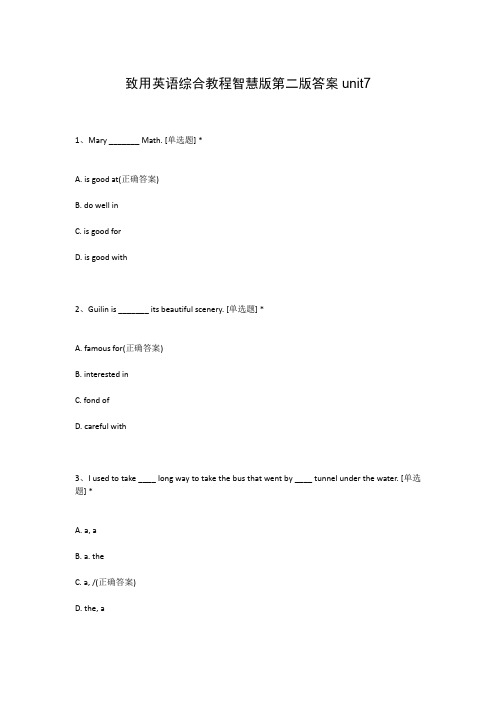
致用英语综合教程智慧版第二版答案unit71、Mary _______ Math. [单选题] *A. is good at(正确答案)B. do well inC. is good forD. is good with2、Guilin is _______ its beautiful scenery. [单选题] *A. famous for(正确答案)B. interested inC. fond ofD. careful with3、I used to take ____ long way to take the bus that went by ____ tunnel under the water. [单选题] *A. a, aB. a. theC. a, /(正确答案)D. the, a4、Grandfather lives with us. We all _______ him when he gets ill. [单选题] *A. look after(正确答案)B. look atC. look forD. look like5、20.Jerry is hard-working. It’s not ______ that he can pass the exam easily. [单选题] * A.surpriseB.surprising (正确答案)C.surprisedD.surprises6、92.China is a big country ________ a long history. [单选题] *A.hasB.haveC.with(正确答案)D.there is7、16.Lily is a lovely girl. We all want to ________ friends with her. [单选题] * A.haveB.make(正确答案)C.doD.take8、—______ do you play basketball?—Twice a week.()[单选题] *A. How often(正确答案)B. How muchC. How manyD. How long9、______ in the library. ()[单选题] *A. Don’t smokingB. No smokeC. No smoking(正确答案)D. Doesn’t smoke10、I _______ seeing you soon. [单选题] *A. look afterB. look forC. look atD. look forward to(正确答案)11、59.—Can I talk to the manager?—Please wait ________ minute. [单选题] *A.anB.a(正确答案)C.theD./12、73.The moonlight goes ____ the window and makes the room bright. [单选题] * A.acrossB.through(正确答案)C.overD.in13、15.This kind of bread is terrible. I do not want to eat it ________. [单选题] *A.any more(正确答案)B.some moreC.no longerD.some longer14、Alice is fond of playing ____ piano while Henry is interested in listening to ___ music. [单选题]A. the, /(正确答案)B. the, theC. the, aD. /, the15、Modern plastics can()very high and very low temperatures. [单选题] *A. stand(正确答案)B. sustainC. carryD. support16、( ) Do you have any difficulty _____ these flowers?I’d like to help you if you need.[单选题] *A in planting(正确答案)B for plantingC with plantingD to plant17、The rain is very heavy _______ we have to stay at home. [单选题] *A. butB. becauseC. so(正确答案)D. and18、( )He gave us____ on how to keep fit. [单选题] *A. some advicesB. some advice(正确答案)C. an adviceD. a advice19、Tony is a quiet student, _______ he is active in class. [单选题] *A. soB. andC. but(正确答案)D. or20、77.–Hey! Any idea about learning abroad? --You ()google the College Board to learn the names of college you ____ be interested in [单选题] *A. may;needB. can; might (正确答案)C. will; shouldD. shall; must21、---Where’s that report?---I brought it to you ____you were in Mr. Black’s office yesterday. [单选题] *A. ifB. when(正确答案)C. becauseD. before22、17.Joe is a good student and he is busy ______ his studies every day. [单选题] *A.inB.with(正确答案)C.byD.for23、I _______ to the tape yesterday evening. [单选题] *A. lookB. listenC. listened(正确答案)D. hear24、This kind of work _______ skills and speed. [单选题] *A. looks forB. waits forC. calls for(正确答案)D. cares for25、She found her wallet()she lost it. [单选题] *A. where(正确答案)B. whenC. in whichD.that26、_________ we don't stop climate change, many animals and plants in the world will be gone. [单选题] *A.AlthoughB.WhileC.If(正确答案)D.Until27、You wouldn' t have caught such ____ bad cold if you hadn' t been caught in ____?rain. [单选题] *A. a, /B. a, aC. a,the(正确答案)D. /, /28、You can borrow my book, _____ you promise to give it back to me by the end of this month. [单选题] *A.even ifB. as long as(正确答案)C. in caseD. even though29、_____ the plan carefully,he rejected it. [单选题] *A. To have consideredB.To considerC. Having considered(正确答案)D. Considering30、Don’t _______. He is OK. [单选题] *A. worry(正确答案)B. worried aboutC. worry aboutD. worried。
致用英语综合教程 2 综合英语2 unit 2
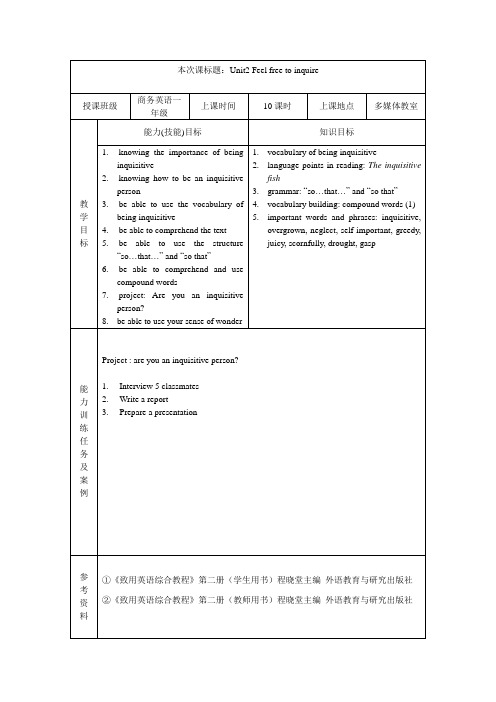
Period One – Around the TopicPeriod Length: 50 minutesGoals- Activate background knowledge about curiosityPurposes- Get familiar with vocabulary related with curiosity and being inquisitive- Obtain background knowledge about curiosity and being inquisitiveStep 1: Vocabulary (20 minutes)- Ask students to work on the V ocabulary on Page 18- Encourage students to think as more as possible- List these word on the board or screenStep 2: Discovery and Discussion (30 minutes)- Work on the quiz ‘Are you curious?’ on Page 20 as a whole and give explanations if necessary to understand whether they are curious or not.- Discuss the issue of being curious and inquisitive in groups with reference to the questions listed on Page 18- Discuss both the advantages and disadvantages of curiosity- Ask each group to present their results in frontKey points- All activities be carried out in English- Inspect each group for the purpose of guidance and promotionHomework- Think in depth the advantages and disadvantages of being curiousPeriod Two – Reading (1): The Inquisitive FishPeriod Length: 50 minutesGoals- V ocabulary and grammar- Discourse knowledgePurposes- Learn new words and expressions- Understand key grammar points- Understand related discourse knowledgeStep 1: Pre-reading Tasks (15 minutes)- Discuss briefly the questions on Page 21 in groups- Check briefly the preview results from studentsStep 2: Reading activity (Part One: 25 minutes)- Listen to the reading- Ask students to present new words and sentences in groups- Ask students to give feedbacks for the information presented- Give more explanations to the new words and sentences- Provide extra knowledge about new words- Guide more on sentences and grammarStep 3: Summarization (10 minutes)- Summarize the words and sentences- Summarize the text learntKey points- Instructions and tasks carried in English, Chinese is used only when necessaryHomework- Review the learnt sections- Preview the following parts and exercisesPeriod Three – Reading (2): The Inquisitive FishPeriod Length: 50 minutesGoals- V ocabulary and grammar- Discourse knowledgePurposes- Learn new words and expressions- Understand key grammar points- Understand related discourse knowledgeStep 1: Pre-reading Tasks (15 minutes)- Discuss briefly the previously learnt part for understanding- Check briefly the preview results from studentsStep 2: Reading activity (Part Two: 25 minutes)- Listen to the reading- Ask students to present new words and sentences in groups- Ask students to give feedbacks for the information presented- Give more explanations to the new words and sentences- Provide extra knowledge about new words- Guide more on sentences and grammar- Check the comprehension questions on Page 23Step 3: Summarization (10 minutes)- Summarize the words and sentences- Summarize the text learntKey points- Instructions and tasks carried in English, Chinese is used only when necessaryHomework- Review the learnt sections- Preview the following parts and exercisesPeriod Four – Reading (3): The Inquisitive FishPeriod Length: 50 minutesGoals- Enhance the vocabulary abilityPurposes- Learn detailed usage of certain words- Learn detailed usage of certain language structuresStep 1: Exercise A (15 minutes)- Work Vocabulary and Structure exercise A on Page 24 in groups- Check and compare answers in groups and negotiate them- Ask students to present their answers- Provide feedbacks for answersStep 2: Exercise B (15 minutes)- Work exercise B on Page 24 in groups- Check and compare answers in groups and negotiate them- Ask students to present their answers- Provide feedbacks for answersStep 3: Exercise C (20 minutes)- Work exercise C on Page 25 in groups- Check and compare answers in groups and negotiate them- Ask students to present their answers- Provide feedbacks for answersKey points- Instructions and activities be carried in EnglishHomework- Finish Writing Task on Page 25 and turn them in due next period- Prepare for the grammar and vocabulary exercisesPeriod Five – Language in UsePeriod Length: 50 minutesGoals- Grammar knowledge and vocabulary buildingPurposes- ‘so…that…’ & ‘so that’ structures- Compound words 1Step 1: ‘so…that…’ and ‘so that’ structures (30 minutes)- Test grammar knowledge on Page 26 for checking grammar abilities- Work on exercises A, B & C on Pages 26 & 27 in groups- Ask students to present their answers and provide necessary explanations- Give supplementary information on those structures if necessaryStep 2: Compound words 1 (20 minutes)- Work on exercises A & B on Pages 28 in groups- Ask students to present their answers and explain Compound words- Give supplementary information on Compound words if necessaryKey points- Give instructions in English- Explain grammar knowledge in ChineseHomeworkPeriod Six – Extension: Wisdom comes to the inquisitive mindPeriod Length: 50 minutesGoals- Extend reading abilitiesPurposes- Apply previously learnt vocabulary and cultural knowledge in reading- Develop reading abilities- Improve abilities on negotiation and discussionStep 1: Reading (20 minutes)- Ask students to read Wisdom comes to the Inquisitive Mind on Page 30 in groups - Understand new words and sentences within the group by negotiating in English - Finish Vocabulary Check on Page 31Step 2: Discussion (30 minutes)- Discuss questions listed on Page 31- Ask each group to present their opinions for the questions in front- Give feedbacks and remarks for presentationsKey points- Inspect group discussions and give guidance to promote discussionsHomework- Review previously learnt materials- Prepare for the ProjectPeriod Seven – Project (1): Are You an Inquisitive Person?Period Length: 50 minutesGoals- Teamwork abilitiesPurposes- Apply previously learnt words and cultural knowledge into actual use- Develop teamwork abilitiesStep 1: Interview (25 minutes)- Interview classmates for their opinions on being inquisitive with reference on the form and instruction on Page 29Step 2: Report writing (25 minutes)- Ask students to work in pairs or groups to work on the report about being inquisitive based on the interviews- Ask each group to present their reports and provide remarksKey points- All preparations and negotiations be carried in English- Give guidance while students prepare the projectHomeworkPeriod Eight – Project (2): Are You an Inquisitive Person?Period Length: 50 minutesGoals- See abovePurposes- See aboveStep 1: Information Exchange (25 minutes)- Exchange your thoughts about your thoughts and opinions on your results of the interviews.Step 2: Discussion and Debate (25 minutes)- Each group presents the results to the whole class,- Give remarks to the presentations- Group members should also talk about what they have learnt from this interview project.Key points- Give instructions for discussion and debateHomework- Revise writings according to the feedbacks and remarks received- Turn the revised copies before next periodPeriod Nine – Culture Tips: Curiosity Killed the CatPeriod Length: 50 minutesGoals- Understand part of western culture from another perspectivePurposes- Help students to understand western culture- Help students to learn more cultural expressionsStep 1: Warm-up (15 minutes)- Read materials on Curiosity Killed the Cat on Page 32- Help on any new words if necessaryStep 2: Open Discussion (35 minutes)- Ask students to offer more stories related to the topic- Encourage students to pay more attention to the advantages and disadvantages on being curious and inquisitiveAsk s to read it and discuss the qs in 2.(20m)Explain the following words after s finish it.(ppt)(10m)Phychic adj. having the ability to know what others are thinking or what will happen in the future. 通灵的,Stifle v. to stop a feeling from being expressed 强忍,压抑Scrutinize v. to examine very carefully 细看,仔细检查Discard v. to throw away 丢弃,抛弃In a rut (in the same rut) :living in the same situation so that you feel bored. 生活刻板乏味Do a disservice to : to do sth harmful 对……造成伤害、危害Take heart: to feel couraged 鼓起勇气,刚强壮胆Key points- All activities be carried in EnglishHomeworkPeriod Ten – Learning to LearnPeriod Length: 50 minutesAsk one s to readExplain some notes (see teachers’ book)Encourage s to watch the movie with the same name补充材料:Curiosity killed the cat前半句就是常说的:好奇心害死猫,整句话出自1912年尤金·奥尼尔所写的剧本。
Unit 2-致用英语综合教程
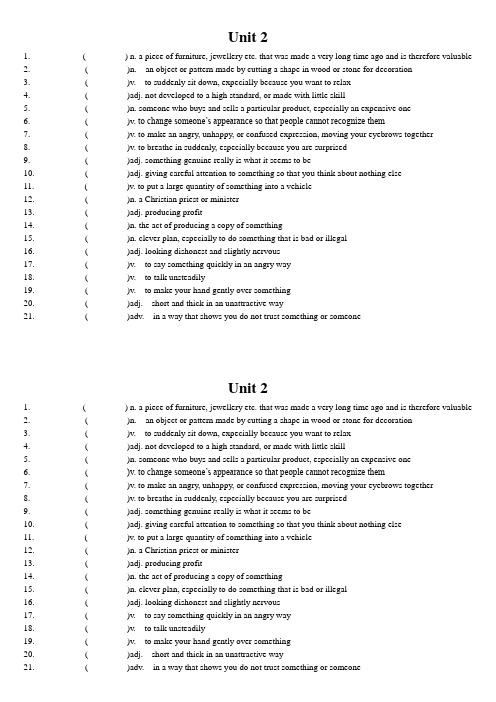
Unit 21.____________( ) n. a piece of furniture, jewellery etc. that was made a very long time ago and is therefore valuable2. ____________( )n. an object or pattern made by cutting a shape in wood or stone for decoration3. ____________( )v. to suddenly sit down, expecially because you want to relax4. ____________( )adj. not developed to a high standard, or made with little skill5. ____________( )n. someone who buys and sells a particular product, especially an expensive one6. ____________( )v. to change someone’s appearance so that people cannot recognize them7. ____________( )v. to make an angry, unhappy, or confused expression, moving your eyebrows together8. ____________( )v. to breathe in suddenly, especially because you are surprised9. ____________( )adj. something genuine really is what it seems to be10. ___________( )adj. giving careful attention to something so that you think about nothing else11. ___________( )v. to put a large quantity of something into a vehicle12. ___________( )n. a Christian priest or minister13. ___________( )adj. producing profit14. ___________( )n. the act of producing a copy of something15. ___________( )n. clever plan, especially to do something that is bad or illegal16. ___________( )adj. looking dishonest and slightly nervous17. ___________( )v. to say something quickly in an angry way18. ___________( )v. to talk unsteadily19. ___________( )v. to make your hand gently over something20. ___________( )adj. short and thick in an unattractive way21. ___________( )adv. in a way that shows you do not trust something or someoneUnit 21.____________( ) n. a piece of furniture, jewellery etc. that was made a very long time ago and is therefore valuable2. ____________( )n. an object or pattern made by cutting a shape in wood or stone for decoration3. ____________( )v. to suddenly sit down, expecially because you want to relax4. ____________( )adj. not developed to a high standard, or made with little skill5. ____________( )n. someone who buys and sells a particular product, especially an expensive one6. ____________( )v. to change someone’s appearance so that people cannot recognize them7. ____________( )v. to make an angry, unhappy, or confused expression, moving your eyebrows together8. ____________( )v. to breathe in suddenly, especially because you are surprised9. ____________( )adj. something genuine really is what it seems to be10. ___________( )adj. giving careful attention to something so that you think about nothing else11. ___________( )v. to put a large quantity of something into a vehicle12. ___________( )n. a Christian priest or minister13. ___________( )adj. producing profit14. ___________( )n. the act of producing a copy of something15. ___________( )n. clever plan, especially to do something that is bad or illegal16. ___________( )adj. looking dishonest and slightly nervous17. ___________( )v. to say something quickly in an angry way18. ___________( )v. to talk unsteadily19. ___________( )v. to make your hand gently over something20. ___________( )adj. short and thick in an unattractive way21. ___________( )adv. in a way that shows you do not trust something or someone。
致用英语综合教程 Unit 2ppt课件

2 The big fat fish gobbled up all the worms and enjoyed the shade of the lily leaves, which left the poor little golden fish with very little to eat and nowhere to escape the hot sun. As he couldn’t spend his time lazing around like the other fish, he had to do a lot of serious thinking to keep himself from being sad. So he explored every corner of the pool, until he knew exactly how many tiles there were, the names of all the weeds, and which lily was going to open next.
a. Gasp. Wait for the shock to subside, then cautiously open the package for which this man/animal has surrendered his life.
b. Shrug. Open the package once you’ve finished reading the newspaper’s list of celebrity birthdays.
2. Are you happy with the present
life? Have you ever thought
致用英语综合教程1_UNIT1_教案及课件
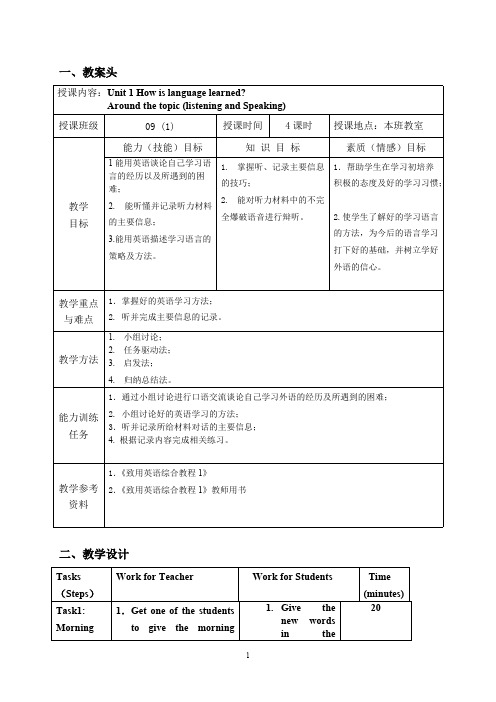
一、教案头授课内容:Unit 1 How is language learned?Around the topic (listening and Speaking)授课班级09 (1)授课时间4课时授课地点:本班教室能力(技能)目标知识目标素质(情感)目标教学目标1能用英语谈论自己学习语言的经历以及所遇到的困难;2.能听懂并记录听力材料的主要信息;3.能用英语描述学习语言的策略及方法。
1. 掌握听、记录主要信息的技巧;2. 能对听力材料中的不完全爆破语音进行辩听。
1.帮助学生在学习初培养积极的态度及好的学习习惯;2.使学生了解好的学习语言的方法,为今后的语言学习打下好的基础,并树立学好外语的信心。
教学重点与难点1.掌握好的英语学习方法;2.听并完成主要信息的记录。
教学方法1.小组讨论;2.任务驱动法;3.启发法;4. 归纳总结法。
能力训练任务1.通过小组讨论进行口语交流谈论自己学习外语的经历及所遇到的困难;2. 小组讨论好的英语学习的方法;3.听并记录所给材料对话的主要信息;4. 根据记录内容完成相关练习。
教学参考资料1.《致用英语综合教程1》2.《致用英语综合教程1》教师用书二、教学设计Tasks (Steps)Work for Teacher Work for Students Time(minutes)Task1: Morning 1.Get one of the studentsto give the morning1.Give thenew wordsin the20report report to the wholeclass;2.Talk about the topic orcomment on their jobs.report;2.Report tothe wholeclass;3.Ask andanswer thequestions.Task 2: Discussion 3.Talk about theexperience of learningEnglish and thedifficulties that evermet while learning;4.Divide the class intosmall groups and getstudents to share theirown experiences oflearning English;5.Invite some to sharewith the whole class.1.Talk about theexperiences oflearning Englishin English;2.Some volunteersshare with theclass.20Task 3: pre-listening activities 1.Get the individual tofinish a quiz.2.Read the scoringmethods andexplanations to theclass.3.Get the Ss to discuss onthe topic: What makesa good Englishlearner ?4.Do class feedback andwrite down the Ss’opinions on the Bb.1.Finish the quiz;2.Count the pointsthey’ve got andfigure out howgood languagelearners they are.3.Discuss in groupsof 4 and preparea presentation infront of class.40Task 4: Discussion 1.Have the students workin groups to discuss theways to learn Englishwell and let them write1.Work in groups todiscuss the waysto learn Englishwell and let them35down;2.Make each groupswrite the ways on theBb;3.Get them to discusswhich ways are the bestand let them talk abouttheir opinions.write down;2.Discuss the bestways to help themto learn English.Task 5: while-listening activities 1. Tell students what theyare going to listen , makethem get ready;2. Ask students to read thequestions first beforelistening;3. Play the recording andencourage them to takenotes while listening;4. Guide them to listen tothe recording three times;5. Get students to checktheir answers..1. Listen for the 1sttime and try to pickout the sameinformation fromthe listeningmaterial as thesuggestions listed onthe Bb.2. Listen for the 2ndtime to note downthe advice. 3. Listenfor the 3rd time tocheck the answers.4. Compare theanswers in pairs.40Task 6 : post-listening activities 1. Play the recording andget the Ss to repeat.2. Get the Ss to discuss ingroups of 4 on Mr.Martin’s opinions.1. Listen and repeat tocorrect the diction.2. Discuss in groups of 4.20Summary Summarize what studentshave learned in this lesson,point out what they shouldmaster.4Homework Pre-learn the words appeared in the word list.1三、教学后记1. 讲课之前让学生用英语简单的介绍一下自己,看看学生的实际水平并相互熟悉,使课堂气氛轻松;2. 在听力练习开始之前,先让学生简单地讨论一下自己的英语学习经历并谈论自己在学习中所遇到的难题以及解决办法,有助于学生更好地抓住听力材料中的关键内容。
- 1、下载文档前请自行甄别文档内容的完整性,平台不提供额外的编辑、内容补充、找答案等附加服务。
- 2、"仅部分预览"的文档,不可在线预览部分如存在完整性等问题,可反馈申请退款(可完整预览的文档不适用该条件!)。
- 3、如文档侵犯您的权益,请联系客服反馈,我们会尽快为您处理(人工客服工作时间:9:00-18:30)。
Reading Comprehension
Para. 10~13
Translation
Reading Comprehension
Translation
BACK
1. 伊拉克与阿富汗的老兵,很难 对“正义之战”做出道德辩护。我
们中的每一位,都挣扎着同自己的
所作所为寻求和解。自杀就像流行
病一般,在战士与老兵中漫延。究
其原因,除了肢体伤残与创伤后精
神障碍之外,第三个因素正得到广
泛的探讨:他们带回来的道德创伤 。
Unit 2
War and peace
Book Three
Second Edition
Unit 2
1 2 3 4 5 6 7
Warm-up Reading A Language in Use Reading B
Project Culture Tips Enjoy English
Warm-up
At the end of World War Ⅱ, Japanese government ignored the
Reading Comprehension
Para. 3~4
Translation
3. After leaving theatres of war, soldiers had been affected to different degrees in those three areas, each of which influences their ability to operate once home. The physical and conceptual components are both too apparent: the soldier who had his testicles blown off or who woke up screaming at night. Moral scars, though less noticeable, have a way of cutting deep, also. And they are not negated as easily as many suppose.
BACK
Pre-reading Tasks
Do you know the wars in Iraq and Afghanistan? What were the consequences of the wars in Iraq and Afghanistan?
BACK
Reading Comprehension
The lonely soldier and the moral scars of war
Translation
Para. 1~2
BACK
1. Veterans of Iraq and Afghanistan find little ethical defence in the “just war”. Each of us struggles to make peace with our actions. In trying to understand the ongoing suicide epidemic among soldiers and veterans, a third factor in addition to physical injuries and PTSD (Post-traumatic Stress Disorder) is now being discussed: the moral injuries they bring back.
12. The more time goes by since leaving the army, the more doubts occur about whether I ever did the right thing. I’ve realised I’ll probably never achieve any answers—perhaps for the best—and should get used to living with the unanswered.
2.
在英国桑德赫斯特进行的军官
培训中,他们教我说,战斗力——
即战争中的行动能力——可以细分
为三个相互依存的构成要素:身体
要素(行动的工具)、概念要素(
如何行动背后的理念),以及道德 要素(驱使人们行动的能力)。
Para. 1、2
Reading Comprehension
Translation
3.
离开战场之后,战士们在这三个领域,都
ultimatum issued by the USA and its allied countries. In order to force Japan to surrender, the United States dropped two atomic bombs on the city of Hiroshima and Nagasaki, which killed as many as 260,000 people by the end of 1945. These are to date the only attacks with nuclear weapons in the history of warfare.
Watch the video and answer the following questions.
What do you see in the video?
1
Describe it with your own words.
Do you think it is right for the USA
2
4. During the ensuing firefight with the Taliban, a soldier spotted a girl—he reckoned a four-yearold—on the roof of an Afghan compound, holding a mobile phone to her ear. He assessed she was a Taliban mortar fire controller, directing intense enemy fire onto his patrol position; they were pinned down as a result. He radioed a jet and directed it to drop a bomb onto the girl and the building.
10. Regardless of numbers killed before, soldiers can feel morally bankrupt facing up to the tally they carry. Each death shames us, eroding our claim to a shared humanity—which isn’t a concept that evaporates by joining the military.
Reading Comprehension
Para. 5~9
Translation
5. “I did what I had to do,” he told me.
6. Not such an easy one for armchair moralists to call. Countless soldiers returned with such experiences on their consciences.
8. Soldiers seek justification for their actions in the aftermath, when reflection is afforded. An obvious source for justification—as well as inspiring many to join the military—is the notion of acting on the “right side”, being part of a broader effort to do some good. But try sustaining that narrative after tours in Iraq and Afghanistan. I couldn’t.
13. Sadly, that’s much easier said than done. As the repercussions of Iraq and Afghanistan play out, many soldiers and veterans will continue making the loneliest of decisions.
11. Soldiers and veterans are keenly aware of the ethical damage of war which they’ve instigated, each in their own way. Everyone reacts differently, but guilt and shame are hard to avoid. Sharing such feelings is immensely hard, as many fear being condemned and consequently feel exiled in society.
